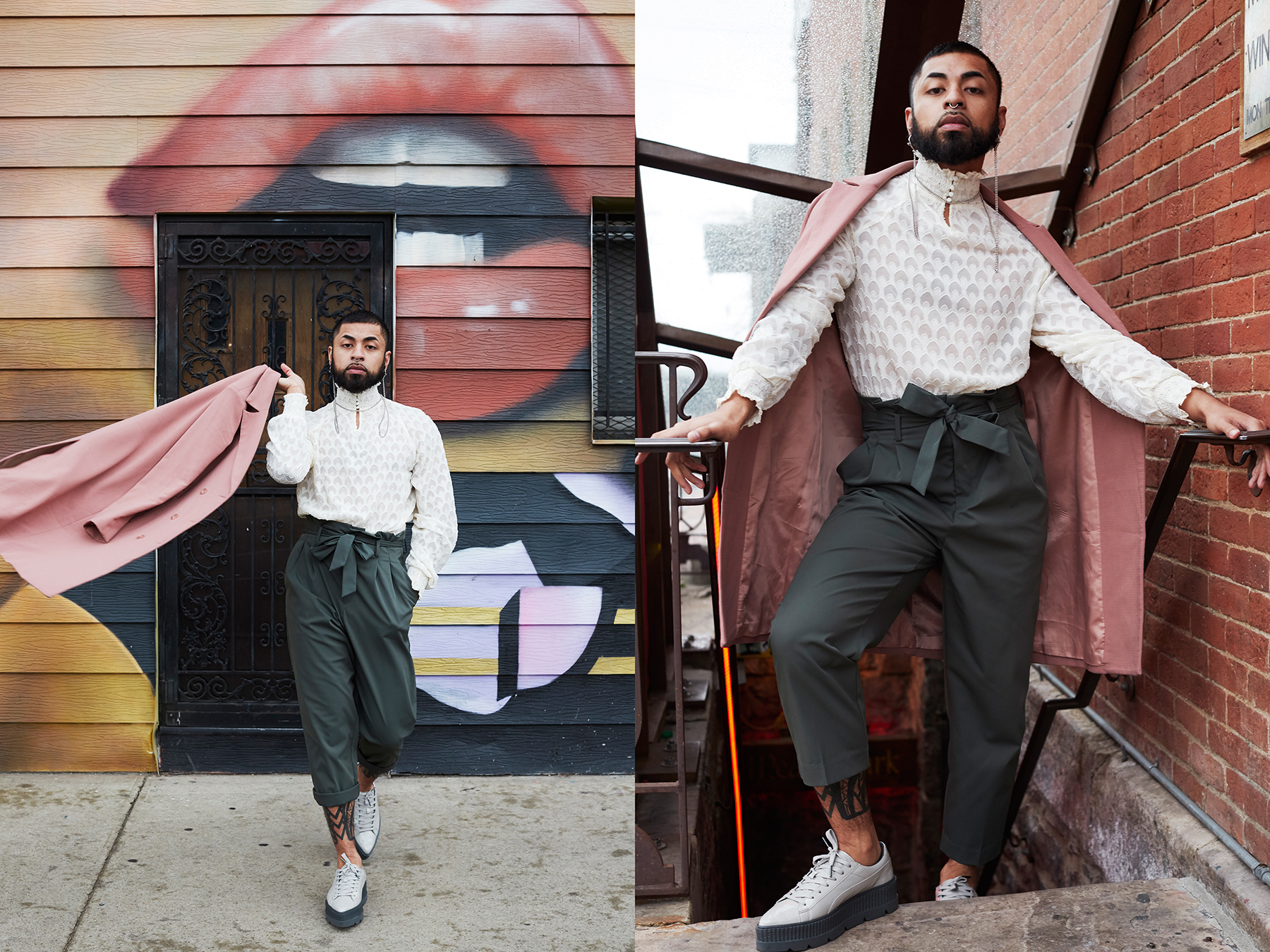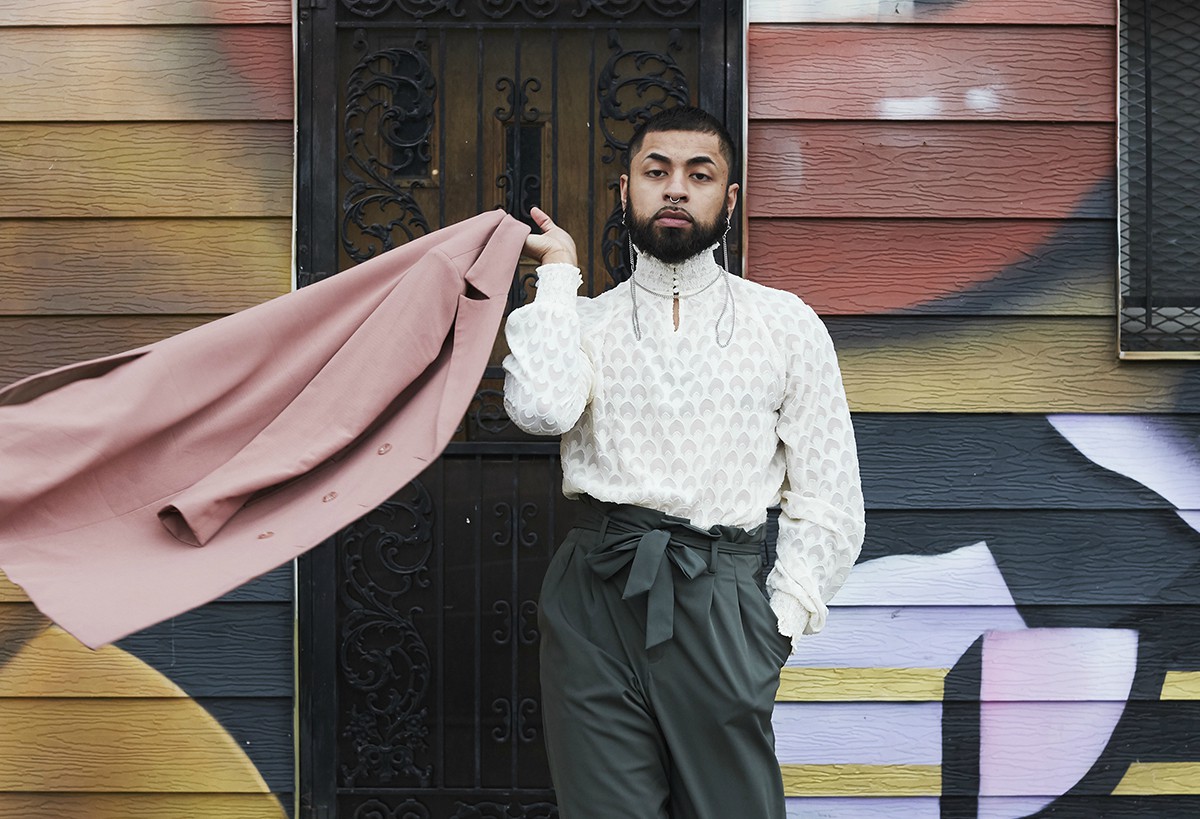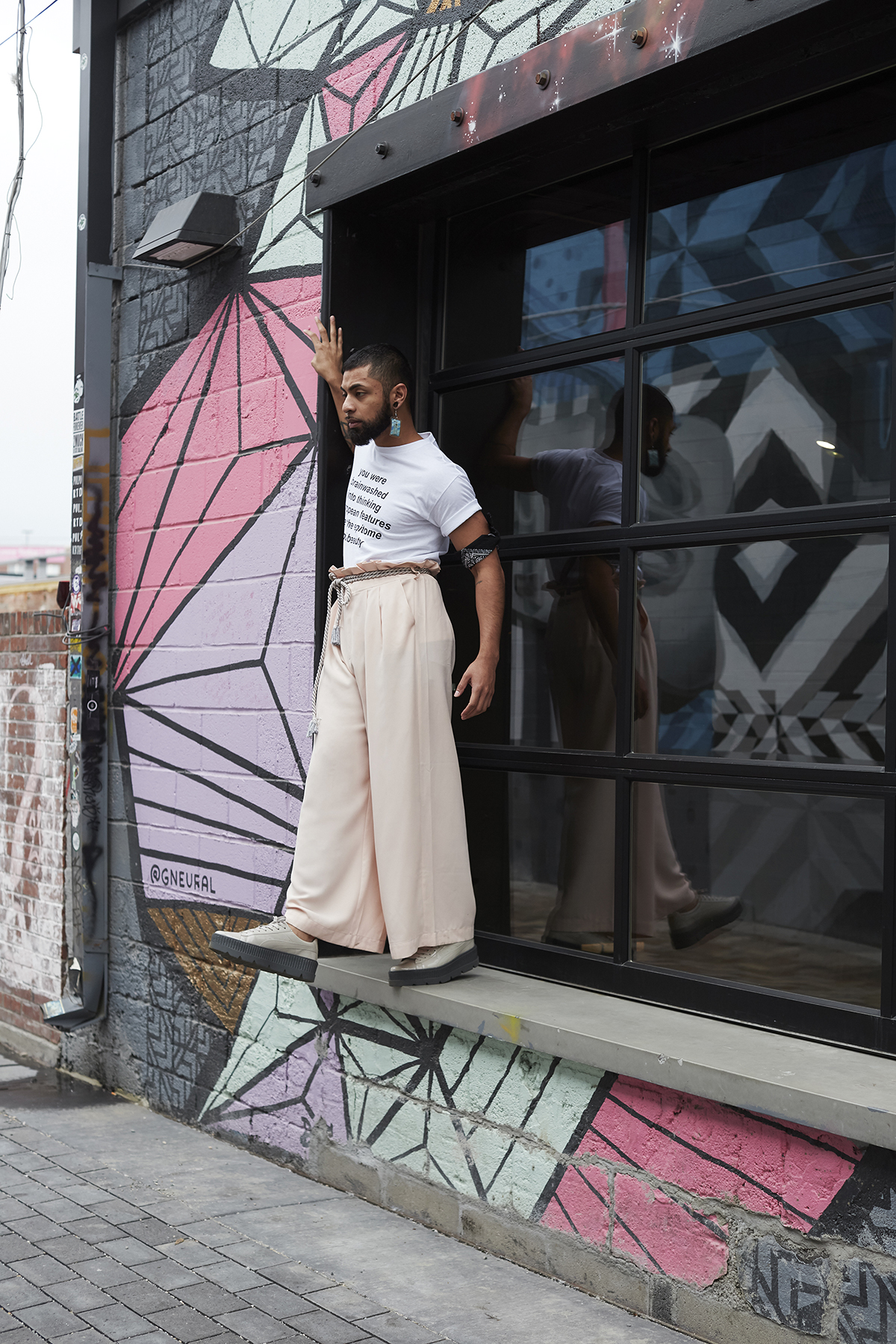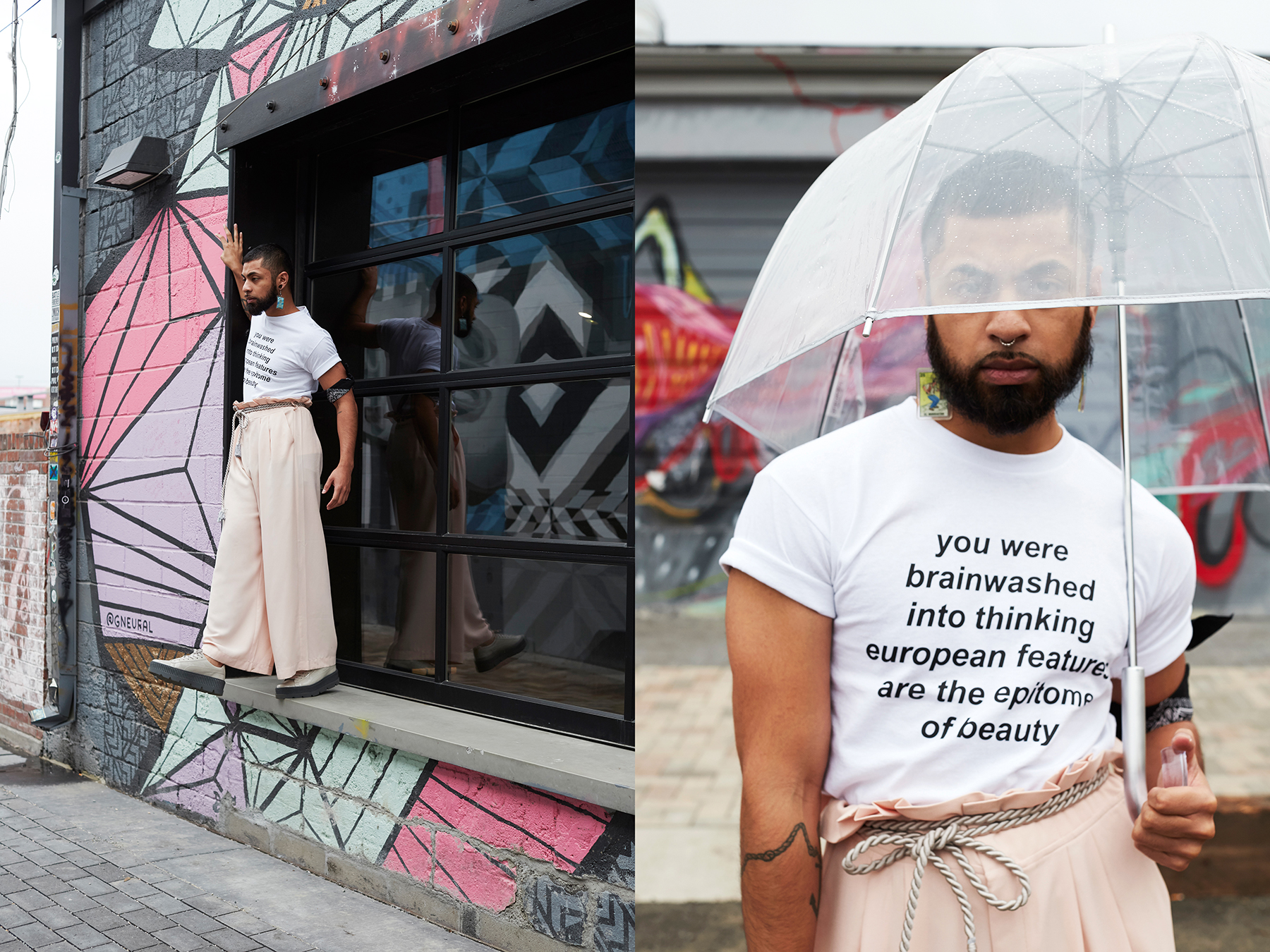Living in America in 2018 isn’t sunshine and rainbows, making it hard to live in your truth. Race and sexuality have to be two of the most controversial topics our country parleys. Choosing to be your true self and owning your entire being from your ethnicity to your sexual identity deserves recognition. That’s why we love Stephen Garcia. If you’ve heard the saying, “do it for the culture,” it’s obvious Garcia lives that mantra every minute of every day.
This Mexican and Samoan fashion enthusiast uses his heritage as a compass and shield in a country that has placed him in a box. As a poet and artist, Garcia has won two Brave New Voices International Youth Poetry Slam Festival competitions. Championing his queerness and femininity, he decided to come out to his family at a local poetry event, Cafe Cultura, with a poem titled “Dear Spock.”
No longer will I imitate a fragile chest of secrets
Breathe in relief and shine with chains falling from these lips
I am gay
And no longer will I hide my love
Dear Spock
Take me into hyperspace to love among the stars
Command me like the Enterprise I’ll let you be in charge
Like beam me up Scotty because you really know how to beam my Scotty up.
With passion and conviction, Garcia shares his journey to accepting his uniqueness while channeling it into his style. This aficionado truly hankers to change the world through fashion and social justice.

READ: 303 Style Profile – Inside Denver Drag Queen Yvie Oddly’s Offbeat Aesthetic
303 Magazine: How is your poetry connected to your love for fashion?
Stephen Garcia: Poetry and fashion, for me, are sometimes the same thing. They both have the ability to tell a story, but one is with words and the other is through clothing. A good poet and poem will make you feel things that have always been inside of you, but on a new level of passion and strength than before. The same goes for fashion. They should be statements of who you are, what you represent and why you feel the way you do. Lately, I’ve attempted to tell different stories of myself through my work as a poet and fashion enthusiast. Whenever I perform my poetry, for the most part, you will know exactly what I’m speaking about and how strongly I feel about the said topic.
Why can’t my appearance do the same thing? You should be able to see the feminine aspects I carry within my bones, the willingness to be an “other” and the sense of pride I have in all that I am. They also compare in the sense that I am constantly trying to find ways to incorporate myself into both spaces as a writer and fashion lover. It also doesn’t hurt to simply slay for the ancestors every once in a while.
303: How do you feel about the representation of diverse backgrounds in Denver’s fashion realm?
SG: Denver has a rich history of poor, hard-working, people of color. I grew up near 11th and Kalamath Street only a few blocks from downtown Denver. Growing up in that area, we called it the “west side,” a place people avoided. It was the “ghetto.” Gentrification transformed what many people believed was a place of disgust by turning it into something new. Meaning the removal of culture and communities that once thrived there. When you think about Denver in the past five to six years, you think about all of the growth. What we tend to forget are the flourishing people that have been here since the beginning. The strong Latinx and Black people that have really planted their roots in Denver’s fruitful soil. Fashion sometimes can be one of those forgetful spaces. Fashion has predominantly been a white space, yet it’s surrounded by such amazing color. There has always been a heavy absence of black and brown people. Not to mention the fact that fashion is riddled with the concept that Eurocentric features are the standards for beauty. I will say that I am proud to have witnessed some pockets of progression, but that does not mean it stops there.
I would love to be able to see an abundance of models of color slay for the gods, more cultural designs that represent a spectrum of people and space for all that love fashion to feel confident. As people of color, it is our duty to become part of these communities so that we can begin to represent ourselves in a positive light. As a growing and learning community as a whole, we need to notice the biases and stereotypes and dismantle them from all creative spaces, fashion especially. We need to celebrate every hairdresser, model, designer, photographer, coordinator, stylist, journalist of color as if we were celebrating ourselves. We are here to stay and the world better be ready for all the talent we have to offer.
303: Being Mexican/Samoan and queer, can you share how you came to accept your uniqueness?
SG: For the longest time I was afraid to accept who I was. I was afraid to be gay in a brown religious family. I was also afraid to be brown in a world fueled by racism and to be me. Living so long with the idea that your existence is some kind of mistake can be extremely dangerous. When I was younger I would rip out and burn the secret love poems I wrote about other boys. I practiced being masculine when I was alone so no one had the opportunity to make fun of me for being too girly, which happened very often. I also suffer from social anxiety and depression. This really distorted my self-projection. I tried so hard to be anything but me. It wasn’t until I became a little older that I truly started to question why I felt the way I did. Why was I so determined to make other people’s visions of me a reality?
Poetry really forced me to dissect those ideas and those hardships. It helped me fall in love with all the things I hated about myself, like my odd features, my dark skin and my feminine traits. When you discover the beauty in yourself through expression you gain a whole new love that no one thing or person can take away from you. It’s truly the birth of decolonizing the mind. I also found some really amazing people that helped me discover that it was okay to just be. These days I could care less about what anyone thinks of me. Good people will love and accept you when you love and accept yourself. Living in my queer and femininity is still a work in progress because for the longest time I let society, my own masculinity and the fear of being too much of an “other” blind me from the elements of self that truly make me who I am today.
“It’s almost like having a really beautiful piece of clothing and never wearing it. We let treasures collect dust and the world never gets to witness and celebrate our essence.”
303: What advice do you have for the young boys of Colorado who are searching for ways to show their passion for fashion and/or social justice?
SG: The world is full of cruel people and things will be said to you that you will never forget, but be powerful, be strong and vibrate anyway. There is enough negativity in this world to make you forget why you’re so important. So I say use that hatred and all of those obstacles to build you a bridge of courage and celebration. Remember that you are brilliant in every way possible. Take chances when the opportunities present themselves to you. Look at ways that you can improve your current skill set and ability and move forward.
Never be afraid to speak your mind on things you feel passionate about. If you don’t stand up for what you believe in, then who will? Make connections when possible. The fight is easier when you have a support system of people that share the same loves and interests as you. Be willing to step out of your comfort zone. There will be challenges along the way that will make you want to step back into the social norms, but look them in the eye and remember why you’re facing them in the first place. Be still when the time calls for it and listen to what the heart truly wants. If you aren’t following your gut feeling you can find yourself in an unhappy space. Always be unapologetically you and slay for the ancestors!
303: What is your favorite poetry piece? Why?
SG: One of my all-time favorite pieces to this day is a poem written by one of my mentors, Ken Arkind. The piece is called “All White Everything” from his book Coyotes. He dedicated it to a goddess of poetry and all things really, named Suzi Q. Smith, and myself. It’s about the gentrification of Denver and is more than extremely dear to my heart.
“Turning poverty into fashion,
We dressed ourselves in someone else’s neighborhood
And screamed when it didn’t fit.”
I can’t even begin to explain what it means to me. Both Ken and Suzi are amazing writers and brilliant people and have helped so many young people find their voices. I am forever thankful for that.
303: You are an advocate for social justice. What do you think of the state of social justice in the Mile High City?
SG: I think Denver can be a real rug of a city. We sweep things under the radar and dress up the streets instead of turning to action and reflection. The city has so many issues that no one wants to talk about. It can be really discouraging to even want to fight for justice among all of our communities. We ignore people of color in general and pretend that poverty doesn’t exist for a large amount of the citizens living here. Good work is happening but we need real action. Not just organized marches that follow street signs the city put up for them to follow like ducklings, but real tangible action. In the past few years, we have lost so many staples in our communities such as the Gypsy House and the Cross Roads Theater. Even my high school, La Academia, is closing this year and it hurts so much to see such good places go away. I’m not sure what the future holds for Denver and social justice. I do know that we have some very talented and dedicated young people here that will carry on the tradition of strength.
All photography by Rebecca Grant.









